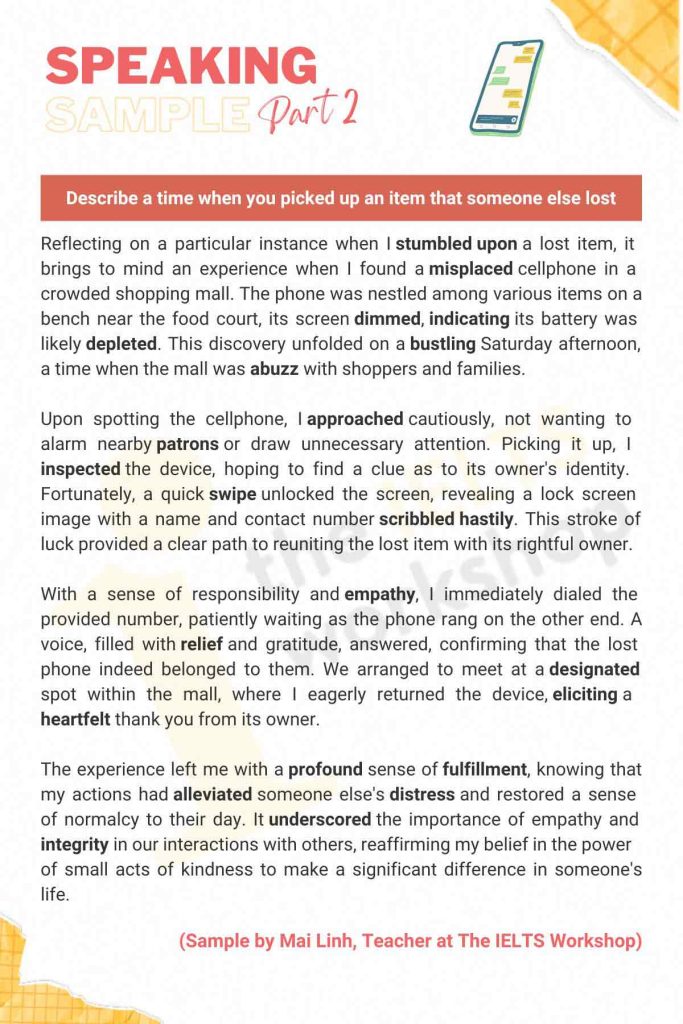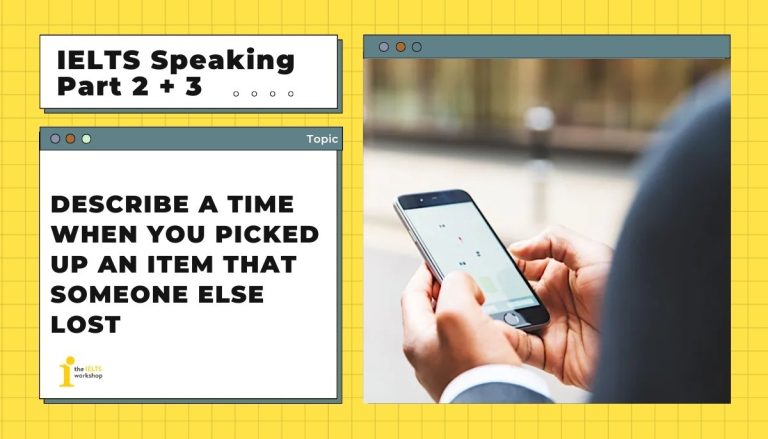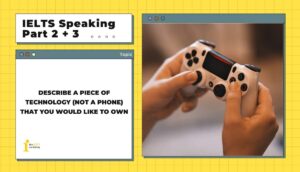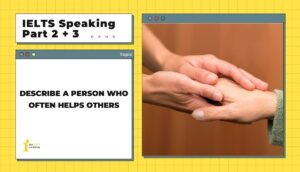Đến với chuyên mục giải đề kỳ này, cô Mai Linh của The IELTS Workshop sẽ hướng dẫn bạn trả lời topic “Describe a time when you picked up an item that someone else lost” trong IELTS Speaking Part 2. Cùng tham khảo sample, từ vựng và một vài cách diễn đạt ghi điểm trong phần thi IELTS Speaking nhé.
Part 2: Describe a time when you picked up an item that someone else lost
Describe a time when you picked up an item that someone else lost
You should say:
What the item was
When and where you found it
What you did after finding it
And explain how you felt about the experience
Dưới đây là bài mẫu cho topic “Describe a time when you picked up an item that someone else lost“.
1. Bài mẫu (Sample)

2. Từ vựng (Vocabulary)
- Stumble (upon) (v) Vấp phải
- Misplace (v) Đặt nhầm chỗ
- Dim (v) mờ
- Indicate (v) Chỉ ra
- Deplete (v) cạn kiệt
- Bustling (v) Nhộn nhịp
- Abuzz (adj) rung
- Approach (v) Tiếp cận
- Patron (n) người bảo trợ
- Inspect (v) Kiểm tra
- Swipe (n) Vuốt
- Scribble (v) Viết nguệch ngoạc
- Hastlity (adv) một cách vội vàng
- Stroke of luck: Sự may mắn đột ngột
- Empathy (n) sự đồng cảm
- Relief (n) sự nhẹ nhõm
- Designate (v) chỉ định
- Elicit (v) Khai thác
- Heartfelt (adj) Chân thành
- Profound (adj) Sâu sắc
- Fulfillment (n) sự hoàn thành
- Alleviate (v) giảm nhẹ
- Distress (n) Đau khổ
- Underscore (v) nhấn mạnh
- Integrity (n) chính trực
Part 3
What kind of people tend to lose things more often than others?
What kind of things do people often lose?
Why do some people find lost things easier than others?
What do you think are the reasons why some people pick up lost things and don’t give them back?
Should parents teach their children to return things lost by others?
Why do some people enjoy collecting antiques or second-hand items?
1. What kind of people tend to lose things more often than others?
Those with chaotic lifestyles or a tendency toward disarray frequently have greater rates of item loss. Lost property might result from distractions and multitasking that intensify this inclination. In addition, people who have trouble managing their time or are forgetful may find that they misplace things easily. This can lead to a tendency for these people to lose items more frequently than others since they don’t value organizing systems or keeping track of their belongings.
- Chaotic (adj) Hỗn loạn
- Disarray (n) hỗn loạn
- Intensify (v) Tăng cường
- Inclination (n) xu hướng
2. What kind of things do people often lose?
People frequently misplace essential items such as keys, wallets, and mobile phones. These are necessities often carried daily, making them susceptible to being set down absent–mindedly or misplaced in various locations. Additionally, smaller objects like eyeglasses, jewelry, or pens are commonly lost due to their size and ease of oversight. These items are often integral to daily routines, making their loss particularly inconvenient and noticeable.
- Necessity (n) vật dụng cần thiết
- Susceptible (adj) Dễ bị ảnh hưởng
- Absent-mindedly (adv) Lơ đãng
- Integral (adj) tích hợp
3. Why do some people find lost things easier than others?
Some people have better observational abilities and attention to detail, which makes it easier for them to find misplaced objects. These individuals find it simpler to identify lost objects because they have a tendency to pick up on small clues and abnormalities in their environment. Those who value order and neat spaces also frequently have specific locations for their possessions, which makes it easier to find missing items quickly. They are better than others at finding misplaced objects because of these habits and characteristics.
- Abnormality (n) sự bất thường
- Possession (n) sự sở hữu
4. What do you think are the reasons why some people pick up lost things and don’t give them back?
People may choose to retrieve misplaced objects rather than returning them for a variety of reasons. First of all, opportunists could take advantage of the finding of misplaced objects, seeing an opportunity for personal gain—financial or otherwise. Furthermore, a lack of empathy or care for others can cause people to downplay the significance of retrieving misplaced possessions. Further factors that may contribute to this behavior include a lack of awareness of the moral need to restore missing property or a fear of becoming embroiled in a complex scenario.
- Retrieve (v) Truy xuất, thu hồi
- Opportunist (n) kẻ cơ hội
- Downplay (v) Hạ thấp
- Moral (adj) Đạo đức
- Embroil (v) thêu dệt
5. Should parents teach their children to return things lost by others?
Yes, parents should instill in their children the importance of returning lost items to their rightful owners. Teaching children this fundamental principle fosters values of honesty, empathy, and responsibility from a young age. By emphasizing the significance of returning lost belongings, parents help shape their children’s moral compass and encourage them to consider the feelings and rights of others. This lesson not only promotes integrity and good citizenship but also contributes to building a more compassionate and considerate society.
- Instill (v) Thấm nhuần
- Compass (n) La bàn
- Compassionate (adj) có lòng nhân đạo/ thương xót
6. Why do some people enjoy collecting antiques or second-hand items?
Finding hidden treasures, nostalgia, and admiration for handicrafts are some of the reasons why collecting antiques or used goods is so appealing. A feeling of curiosity and admiration for the past is fostered by the historical relevance and tangible links these objects provide to the past for a large number of admirers. Gathering antiques and used products is made even more enjoyable by the eco-friendly attraction of upcycling or repurposing beloved items, which is in line with sustainable living standards.
- Nostalgia (n) sự hoài niệm
- Appealing (adj) Hấp dẫn
- Curiosity (n) sự tò mò
- Tangible (adj) hữu hình
Bài mẫu bởi cô Mai Linh – Giáo viên The IELTS Workshop HN
Trên đây là bài mẫu cho topic: Describe a time when you picked up an item that someone else lost. Các bạn có thể tham khảo các bài mẫu IELTS Speaking khác của The IELTS Workshop để có thể nâng cao kỹ năng Speaking của mình.
Ngoài ra để biết thêm được nhiều chiến lược làm bài Speaking thú vị khác, đừng bỏ lỡ khoá học Pre-Senior của The IELTS Workshop nhé.









